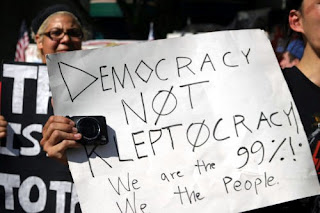Courtesy of Jesse Americain Cafe
"When bad men combine, the good must associate; else they will fall one by one, an unpitied sacrifice in a contemptible struggle."
Edmund Burke
[You can listen to the Benzina radio interview here.]
James Koutoulas is CEO of Typhon Capital Management and recently founded the Commodity Customer Coalition (CCC), comprised of over 7000 customers of MF Global. As an attorney and spokesperson for the CCC, Koutoulas has an inside perspective on the legal maelstrom that has erupted in the wake of the MF Global bankruptcy scandal — he’s leading the charge for the commodities trading community. We asked him for an update on the case.
What is the latest from the proceedings?
I think JP Morgan realizes we made some really good points in our objection to their motion, and they are stalling the hearing on this as much as they can. As of Tuesday, they had continued that hearing from the 15th to the 22nd. They’ve gone ahead and continued that again, so our objection has been pushed back to the 30th.
It’s our guess that they are probably going to throw $20 million at lawyers to figure out a way to beat our little grassroots coalition on it.
They are allowing MF Global Holdings to continue to use this $8 million, but they haven’t gotten the "super-priority" liens that they have sought. From our perspective, let them stall as long as they want and let them throw $20 million worth of lawyers at us. It’s our goal to have this situation resolved in two weeks.
Can they get the money back?
If they commingled funds with their own money, then customers would have clawback rights, similar to the Madoff case. So, that would be a fraudulent conveyance.
Customers, in my opinion, would have rights of recovery from the $1.2 billion in excess equity that sits in the holding company, which is why we are fighting to get on the creditor’s committee, so we have a say in protecting recoveries on the holding company assets.
Moreover, if there was a crime committed, that opens up Corzine, MF Global directors, the $200 million directors and officers insurance policy–that opens all of that up to potential customer recoveries, and we will aggressively be going after all of those sources so that customers are made whole.
This seems like the kind of thing that could be dragged out for years.
It is a mess, and I think it definitely had that potential before we got involved, but I think the world has never seen an organization like ours, that has been put together so quickly–over 7,000 people in under two weeks, with some very experienced lawyers who are actually motivated by helping customers instead of collecting $891 an hour in legal fees.
We’ve gone in there and stopped the train for the moment on the JP Morgan cash collateral use. We’ve gotten the judge to realize the timeliness of the situation, and the judge is an honorable man. He is putting the pressure on the trustees to speed up the process.
I also think we’ve put a lot of pressure on CME. I’ve reached out to the CME. I told them, "Look, there are cases where you could (1) be liable for this," due to the way that they have advertised the sanctity of seg [related] funds in order to drive business through their exchange. I’ve said, "Look, your stock is down something like $2.5 billion in market cap this week, which makes the $600 million look like a drop in the bucket."
The CME could take this major problem that they are having and turn it into an opportunity for goodwill by going out and just putting up the rest of the shortfall. The customers get their money, everybody feels safe, they restore confidence to the futures market, and they get volume going through their exchange again.
I’ve offered to the CME vice chairman that I will go to court and recommend that the judge grant a lien to the CME on the holding company assets should they put up a temporary fund to cover the shortfall. That way, the CME would be pretty well-protected there. Essentially, they’d be putting up a loan rather than just giving away $600 million.
What is your reaction to Ann Barnhardt’s widely circulated letter to her clients at BCM announcing that she was shuttering the firm as a result of the MF Global fallout?
I agree 100 percent with her [on the point that] I think the way everyone handled it initially was terrible, and it made matters worse. As for [her second point about moral obligation to cease facilitation of access to futures markets], I honestly think that is taking the easy way out.
I think we’ve been courageous; we’ve stood in the face of all of these guys who have done things wrong and who have tried to screw over the customers. Sure, that’s a hard thing to do, but I think that it’s important for America to have futures markets.
It’s important for the farmers who go and hedge their risk, or Southwest Airlines, which has been able to maintain high profitability for three years of high oil prices because of their futures hedging program.
I think it’s important that we use this situation as an opportunity to fix what is wrong with the system. If we make enough noise, these people have to listen to us. We’ve come out with a message that, while there is some anger there–and with good reason–it’s been a focused message and it’s been solutions-oriented.
Thus far, the honorable judge Glenn has been receptive to what we have had to say; he’s been reasonable. The trustee has sped up this recovery process. The CME has gone part of the way there with their $300 million guarantee.
I think, within a couple of days, the CME is going to be forced to step up and make customers whole. Once that happens, we can talk about things like class actions to get people the damages back from forced liquidation, and all of that.
We can talk about tweaking the regulations to eliminate the ability of firms to invest in repos. I think there are some changes that we could make. Maybe the CME takes a little portion of their exchange fees–they’re already the highest-paid party in most trades–take one penny per trade and put it toward an insurance fund going forward.
Let me make it clear, I in no way think that other futures customers should have to pay for this particular situation. I think it’s the JP Morgans, it’s the holding company assets, it’s Corzine and the other directors personally that should have to pay for this particular mess.
But look, Ann, don’t quit. It’s an easy thing to quit. Stand up and fight. Make your voice heard and advocate on behalf of your customers, like what we are doing. We would be welcome to have her join our side if she were so inclined.
It seems like the CME is one of the parties with the most at stake here.I think that is 100 percent accurate. Look, if I’m the CME, I don’t look at this as a morality play. They are a publicly-traded company. It’s good business to make customers whole as fast as possible, and it’s not like they are going to cut a check they are never going to get back.
They could go in and get liens on holding company assets, pay people out, and get them trading ASAP. It’s a great business decision.
The CME board is a big board. There is a lot of old-school people there, so I think it takes some time to form a consensus, but I think within a couple of days they are going to have to cave and step up to the plate here for the full amount.
That makes our job easier, it makes the customer’s job easier, it deprives the trustee of being able to hold this thing up for three years. It makes them have to get the money out now, and everybody except the trustee and probably JP Morgan and Bank of America win. Guess what? I’m OK with that.
Is the CME big enough to win out over entities like JP Morgan?
"Honestly, it doesn’t matter who is big enough if you have people on your side who know the law. The law favors the customers. The problem that normally happens is the customers don’t have the quality legal representation they need to fight the big guys.
We’re working with Barnes and Thornburg as co-councel and they’ve assigned some brilliant partners, both on the litigation side and on the bankruptcy side. We have Sam Tenenbaum, head of Northwestern Investor Protection Clinic, who has been litigating for 35 years. He has gone toe-to-toe with Goldman Sachs and won several times.
And you’ve got me, who truly understands the futures business, but is also an attorney, an organizer, and a good spokesman. And I think that legal team poses a challenge that these high-priced bank lawyers have never seen before."
What’s going to happen next?
"I honestly think the CME is going to step up and make customers whole. If they don’t do that, we’re going to proceed with our plans. Yesterday we met with the Trustee at the judge’s orders and we proposed a plan for distribution of partial customer assets that would move about 6-12 months faster than the Trustee’s plan.
At this point, we’re still open to working with the Trustee; I offered to work with them to implement this. They thus far have not been receptive to that, so unless there is a change of heart there, we’re going to come forward and put our plan in front of a judge on Tuesday.
We’re also going to continue our efforts to have the Commodity Customer Coalition represented on the creditors’ committee in the holdings companies case to protect customers against [Bank of America, JP Morgan, and others] who, in addition to being on the committee, are trying to set up vulture funds where they can buy customers’ claims for pennies on the dollar and then get paid out once this whole thing is resolved – which I think is a conflict of interest.
We’re going to support Tim Butler’s motion on Tuesday. Attorney Butler has filed on behalf of his brother to push for the release of 85 percent of funds now, since the stated shortfall is only 11.6 percent.
We also want to see Corzine in court, under oath, and we want to hear his answer to where he thinks the money is and give him the option to be honorable and forthright, or to be a coward and take the Fifth.
I want to show the American people that no matter how connected you are, no matter if you were the Governor of New Jersey, no matter if you were a senator, if you break the law you should go to jail. And quite frankly, I think it’s a disgrace that no one went to jail over the crisis in 2008.
All the people who gave triple-A credit ratings to essentially junk securities, none of them went to jail, none of the people who sold those went to jail, none of the people who committed mortgage fraud went to jail – I think it’s ridiculous. If [Corzine] did commit a crime, I want to see him behind bars."




